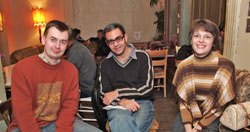Into the streets and across the globe

Stanislav Novokshonov and Julia Zemlyanikina (on either side of University of the Streets Café Co-ordinator Eric Abitbol) at an event at Mile End’s Café Esperanza late last year.
Photo by kate hutchinson
The University of the Streets Café (USC) started as a pilot project of Concordia’s Institute in Manage-ment and Community Develop-ment in the spring of 2003.
Initially conceived as a bridge between academia’s ivory tower and grass roots community organizers, the project has expanded in multiple directions. Coordinator Eric Abitbol said the program provides a way “to bring people together who are engaged, but not necessarily affiliated with institutions.”
The USC sponsors a series of public conversations in cafés around town. Someone familiar with the subject is invited to lead the discussion, but each event is ultimately driven by who turns up.
Over the years, different themes have caught on. The program now runs over a half dozen series ranging from art and society to globalization, capitalism and economics, and a Latin American series of Spanish and English singing, poetry and performance.
“Meetings under the theme ‘technology, culture and power’ will bring together geeks, community workers and interested individuals,” Abitbol said.
The process is very fluid. “Someone will get in touch with us and suggest we organize a conversation about water to commemorate an international awareness day.” Then a space is secured, publicity coordinated and anyone interested in the subject can show up at the designated time and place.
Abitbol said that contacts are extending further and further afield. He has been approached by groups in San Francisco, Nigeria and Europe about how the program developed. USC is involved in national teleconferenced conversations on First Nations issues. Over the holidays, regular USC moderator, Gerardo Sierra found himself leading a discussion in Mexico City.
Last month, two organizers of the Youth Labour Exchange (YLE) in Nizhny Novgorod, Russia, came here to learn about the USC model.
“I found out about the program last year while visiting Canada,” said Stanislav Novokshonov, while waiting for a discussion on art and corporate culture to begin at Café Esperanza.
YLE develops links between local businesses, nonprofit organizations and youth, both for career planning and community problem-solving. Members make uniforms for local restaurant staff to raise funds to support local programs.
Novokshonov was intrigued by what he saw last year and raised money through the Canadian International Development Agency to come back for a second trip with Julia Zemlyanikina, who was also impressed. “We could sponsor conversations on violence, poverty and ecological problems,” said Zemlyanikina.
Both representatives met with moderators, organizers and volunteers of the USC and attended a handful of events. Novokshonov and Zemlyanikina spent one week here, and another week divided between Toronto and Ottawa.
Information technology was of interest to the pair because of its outreach potential. They met local experts like Concordia sociology student Michael Lenczner, who is one of the founders of the wireless internet promotional group Île Sans Fil (see CTR, Oct. 13, 2005).
Although Abitbol has not yet seen the Russian couple’s report, he said they “were struck by the willingness of people here to share their ideas and thoughts.”
Locally, USC continues to grow, with increasing support from the university. Recently, ties have been developed through the alumni association.
“It’s an interesting way for the university to approach alumni,” Abitbol said. “It allows them to be involved in a community of learning.”
Meanwhile, the USC is involved in a fundraising push of their own. The hope to raise a sixth of their annual $60,000 operating budget through donations.
In addition to continuing to program events on a growing number of themes, Abitbol is working on a document which will track the development of the USC so others to adapt the model to their own needs.